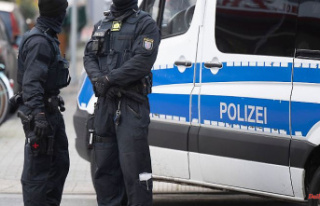In addition to Berlin, Munich has been the place where activists have been taking extreme actions to draw attention to the lack of climate protection for weeks. The interior ministry's line is unmistakable - even after the minister's direct talks with activists.
Munich (dpa / lby) - Since October 25, climate activists in Bavaria have carried out twenty blockade actions. "Eighteen of these happened in Munich, one in Kempten and one in Augsburg," said Interior Minister Joachim Herrmann (CSU) on Wednesday in the Bavarian state parliament's interior committee. Previously there had been an almost two-month break over the summer. Attempts prevented by the police are not included in the total number.
In the last few weeks in Munich, a total of 40 of the 68 climate activists involved in blockades have been taken into police custody - 30 of them for a week or longer, said Herrmann. All of the people taken into custody for a longer period of time are exclusively repeat offenders, some with more than five actions in Munich alone, and some with a nationwide history. "There are currently four incorrigible repeat offenders in police custody."
According to the police, the activists concerned had stuck themselves to Munich's Karlsplatz (Stachus) on Tuesday evening - after the police had already been in action in the morning for several actions, including on the A9 and 96 motorways. A police spokesman was initially unable to say on Wednesday how long the detention should last.
On Tuesday evening, the Evangelical Bishop Heinrich Bedford-Strohm brought together climate activists from the group "Last Generation" and Minister of the Interior Herrmann for a conversation. According to a spokesman for the regional church, Bedford-Strohm had suggested a kind of Christmas break in the protests. However, a spokeswoman for the group said on Wednesday that a Christmas break was out of the question because time was too short. "We will continue and intensify the blockades."
Herrmann, on the other hand, emphasized on Wednesday that the aim of the climate activists was to achieve a high level of media attention through the most sensational actions possible - even at the expense of sometimes considerable damage and impairments to third parties - and thus to put pressure on politicians. In most cases, those affected have nothing to do with the action, but are merely "the activists' bargaining chip against politicians".
The climate activists came from a spectrum of people who were mainly nourished by a coalition of "civilian resistance groups" formed in October 2022, said Herrmann. "Since then they have operated together under the banner 'Unite Against Climate Failure'". The groups "Last Generation" and "Scientist Rebellion", which have been increasingly active in Munich in recent weeks and months, are part of this merger.
"It is also noticeable that those involved in the actions taking place here often do not live in Bavaria themselves, but travel from all over Germany or from abroad to commit crimes here," said Herrmann. Only a third live in Bavaria.
The State Office for the Protection of the Constitution is following the actions of the "Last Generation" closely, and the organization is currently not being observed by the Office for the Protection of the Constitution "due to the lack of legal requirements," he said. However, that does not rule out the possibility that individuals from other contexts are already under observation.
In principle, freedom of expression is protected in Germany, but no criminal offenses should be accepted as a form of protest, said Herrmann. "The violent implementation of one's own ideas - as we see it in these blockade actions - is not covered by the Basic Law."
In the majority of cases in Bavaria, there is an initial suspicion of property damage, coercion, trespassing and violations of the Bavarian Assembly Act. In addition, there is still a high risk that emergency vehicles will get stuck in the traffic jams that have been produced and will therefore not be able to help in the event of an accident.
After the activists had publicly announced and implemented their actions in advance, the use of longer-term "detention was an effective and proven means of averting danger," said Herrmann. But this is not an automatism. Proportionality is checked in each individual case.
The Bavarian riot police and many other police headquarters now have specially trained and equipped "glue-on teams", i.e. police officers who are trained to solve stuck problems, said Herrmann.












